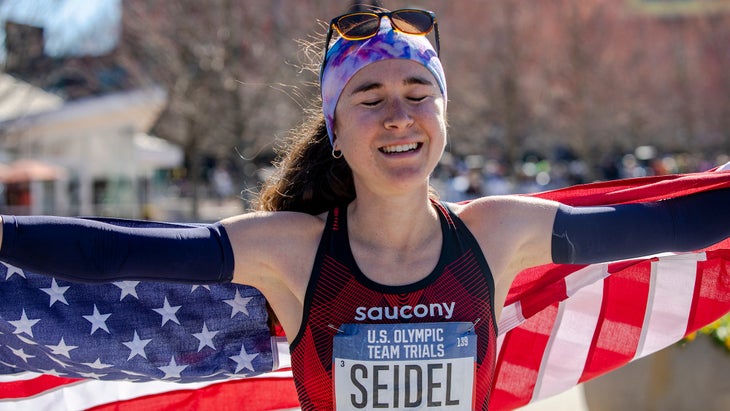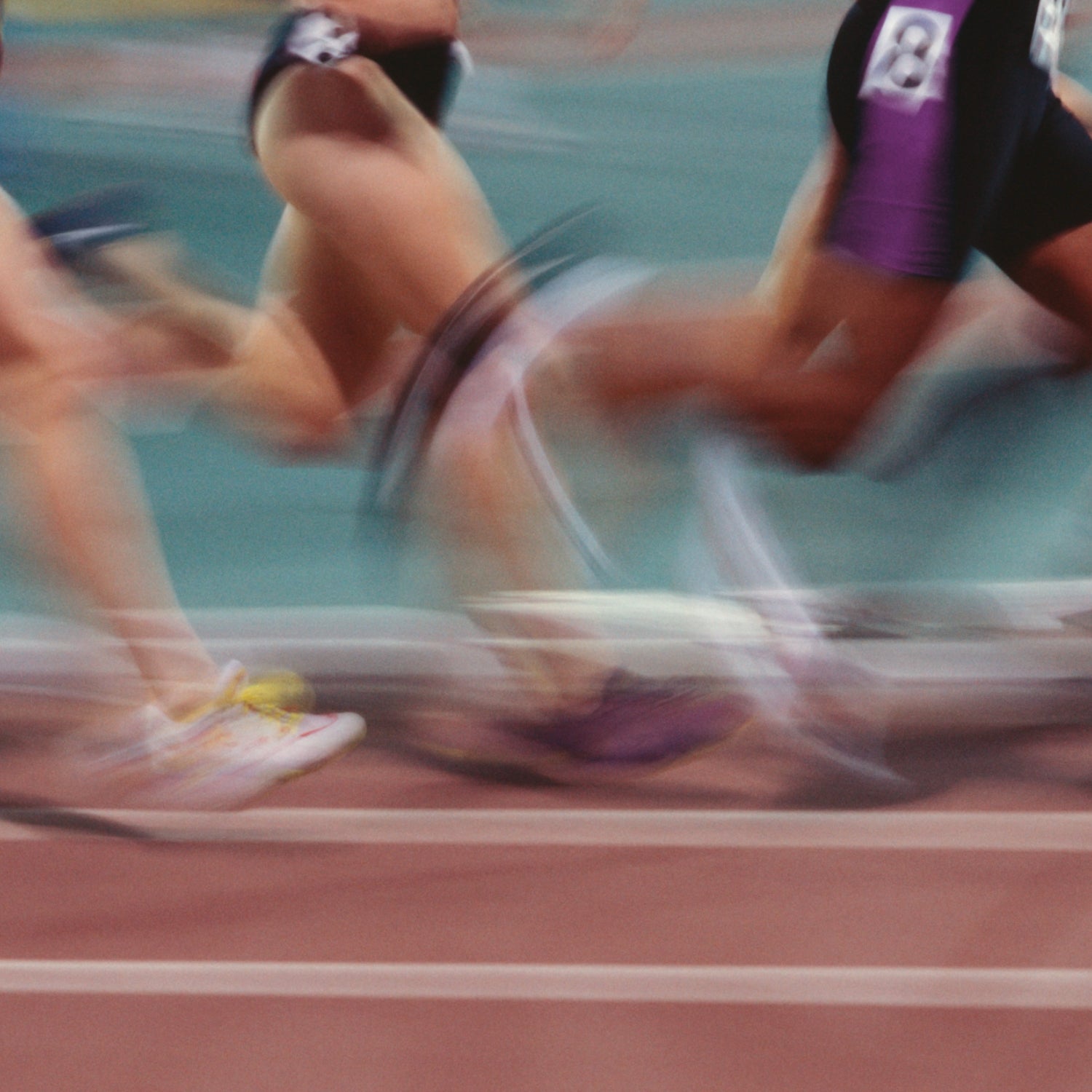In 2016, then-21-year-old Molly Seidel was the top distance runner in the NCAA and seemed destined for a thriving athletic career. But a series of injuries sidelined the Notre Dame student from that year’s Olympic Trials. That summer, she quietly checked into a four-month-long eating disorder treatment program.
“It was the kind of thing where it had to be so secretive, and it was such a shameful thing at the time,” Seidel says now. “Even within my own family, we weren’t going to admit what it was. It was just such a different time.”
She returned to Indiana to wrap up her collegiate career in 2017. Her post-grad years were plagued by more injuries, including one to her hip that required surgery and caused her to miss months of training. All the while, she continued to work on her mental health.
When Seidel joined her friend Julia Hanlon’s podcast as a guest in January 2020, she was finally ready to speak publicly about what she had been through.
“I’ve dealt with depression basically since I was 16, and have been on medication on and off,” Seidel said, adding that her symptoms worsened in college. “I find with my depression it is kind of just this spiral you go into, and you find you can’t get out of it. … You just get stuck, and your brain is stuck.”

As Seidel’s career took off, she continued to be forthcoming about her mental health struggles. In a ahead of the Tokyo Olympic Marathon Trials in 2020, Seidel talked about how dealing with depression, anxiety, obsessive-compulsive disorder, and an eating disorder had affected her as an athlete. When she qualified for the Olympics, the publicity hit a fever pitch. As more people discovered her story, the number of her Instagram followers shot up from about 5,000 to 70,000. Seidel felt the discourse flattened her into one of two archetypes.
“It’s like you’re either a martyr hero that people put on a pedestal, or you are the worst thing in the world, and people will tear you down,” Seidel says.
But after years of shame and staying silent, coming forward felt good—like maybe she had made a difference for others in her shoes.
“That was one of the first moments I would be like, ‘Oh man, maybe a lot of people go through this. And maybe a lot of people are feeling the same ways that I’ve been feeling and have also just been waiting for someone to actually say it, too.’�ĝ��
Why Confidential Mental Health Treatment Matters
In the years since that podcast interview, Seidel’s candor has become a core part of her public persona. She’s relatable and transparent, and when she has to take a break from competition—whether that be for her mental or physical health—she tells her fans what’s going on. “I’m really fucking bummed,” she said in February, after she announced that she was pulling out of this year’s Olympic Trials due to injury.
She’s not alone. Athletes like the gymnast Simone Biles, tennis star Naomi Osaka, and NBA player Kevin Love have all shared intimate details about their experiences with performance anxiety, depression, and more. Their disclosures have helped to reduce mental health stigma in and out of sports.
This growing culture of openness can be liberating for both athletes and their fans, but it can also set a tricky precedent. As conversations around mental health become more normalized in sports, it’s important to recognize that athletes don’t owe the public a glimpse into their struggles.
Historically, sports journalism has included extensive reporting on athletes’ physical health and ailments, says Mike Delayo, a Penn State PhD candidate who wrote his master’s thesis about the rhetoric of athlete mental health disclosures. That has led to a culture where some fans feel like they need to know all of an��athletes’ medical information, including mental health challenges they might like to keep private.
“When we have sports reporters talking about the mechanics of the surgery that an athlete just had, and what effect it’s having on their bodies,” Delayo says, it can be easy for the public to feel entitled to even more personal information.
As conversations around mental health become more normalized in sports, it’s important to recognize that athletes don’t owe the public a glimpse into their struggles.
As I spoke to dozens of athletes and experts in the course of reporting and writing my book ,��I found that confidential mental health treatment is key to recovery for athletes—just like anyone else. When athletes are allowed to keep the details confined to their close support networks, they are able to process their experiences at their own pace. They might be ready to publicly share some of what they’ve been through in a week, a month, a year, or a decade—or they might never be ready at all, and that’s okay.
Whether it’s due to a social media culture that values oversharing or invasive questions from fans and journalists, athletes can sometimes feel obligated to talk about their mental health challenges. Ron Bishop, a communications professor at Drexel University, says he’s seen how this phenomenon plays out in the NCAA. “Athletes would somehow have to come up with a way to talk about [mental illness] with the press, kind of like it’s a required part of their journey,” says Bishop, author of the 2023 book . “And that can obscure the fact that you don’t have to, necessarily. You could just deal with it privately with your family.”
How Athletes Take Control of Their Own Narratives
Professional rock climber Sasha DiGiulian, the subject of the new HBO documentary , says she does feel compelled to speak out about what she’s been through with depression and body dysmorphia. But importantly, that sense of obligation doesn’t come from external sources.
“I’ve always operated my career as wanting to reflect all the dimensionality of who I am beyond just being a climber,” she says. “And so, for that reason, I do feel a responsibility to share what I’m going through with my audience.”

When deciding whether to share her diagnosis of anorexia, former Olympic alpine ski racer Alice Merryweather wasn’t responding to pressure from fans or the media—she simply felt she owed it to herself to be transparent. So, she posted an update about her treatment on Instagram at the beginning of the 2020-21 season.
“Over the past few months, I have been struggling with an eating disorder. It has beaten me down, broken my heart, drained me, and quite nearly destroyed my passion for the sport I love so dearly,” Merryweather wrote. “Luckily, I am surrounded by some of the best people in the world who helped me come to terms with my disorder and encouraged me to seek help.”
Sharing the post was a way for Merryweather to be proud of the effort she was making to get better.
“I had felt so ashamed of it, and I was embarrassed. And I felt alone,” Merryweather says. “The best way for me to conquer that was to be open, and just lean into everything that I was going through. And so it was therapeutic for me.”
View this post on Instagram
Deciding whether and when to go public with a history of mental illness can be a complicated process for athletes. There may be drawbacks that accompany strongly tying your identity—and your “brand,” so to speak—to mental health awareness. Not everyone wants to become a spokesperson, but they might inadvertently be stuck with the label after opening up.
“Sometimes, it’s like people want to see me as the eating-disorder athlete or the ADHD athlete,” Seidel says. “And I’m like, ‘No, I am an athlete.’�ĝ
Overly simplistic narratives about athletes “overcoming” mental illness can also lead to feelings of shame when recovery isn’t linear, as it hardly ever is. After Seidel returned home with a bronze medal from the Tokyo Games in 2021, she had a relapse of her eating disorder. She checked herself into treatment again in 2022. “I felt like such a hypocrite because people had held me up as this mental health advocate,” she says.
One thing Seidel, DiGiulian, and Merryweather have in common is the need to maintain a sense of agency and control over the messages they share. Instead of getting vulnerable at a press conference, they’d rather share their experiences on Instagram.
“I’ve had my fair share of interviews where they are specifically aiming to get shit out of you, and you can always tell,” Seidel says. “We’ve had to pull the plug on a couple of media things because it’s like mental-health baiting.”
But for all the potential downsides associated with being open about her mental health, Seidel says she wouldn’t have it any other way.
“I remember being that kid in college who had no space to talk about her eating disorder, and it consumed me. It almost killed me,” Seidel says. “Having the space to be able to not only put it out into the light but also have the connection with people who say, ‘Hey, we see you. We’ve experienced this too. You’re not alone in it’—I think that has probably been one of the most healing experiences I’ve been able to have.”


